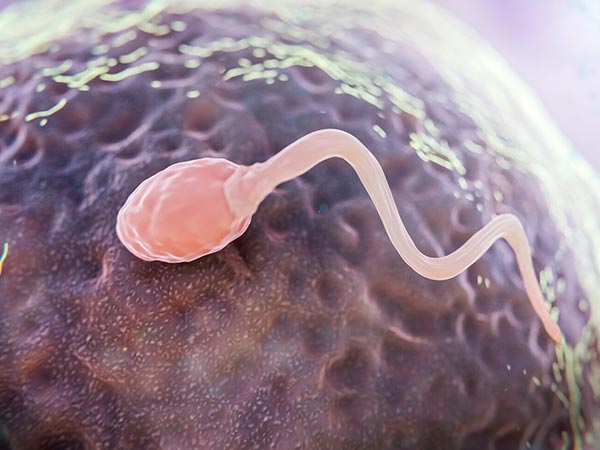Sperm DNA fragmentation test

We analyse breaks or lesions in the DNA strands of spermatozoa

DNA fragmentation test

Why perform the sperm DNA fragmentation test?
The male infertility test analyses breaks or lesions in the DNA strands of spermatozoa which may be the cause of low fertilisation rates, slow embryo development and an increased risk of miscarriage.
Would you like us to study your case?
At Tambre we perform this sperm DNA fragmentation test as a complement to the semen analysis in the study of the male factor.
What is sperm DNA fragmentation?
Sperm DNA fragmentation is one of the causes of male infertility. It consists of the breakage or damage to the genetic material of the spermatozoa, i.e. its DNA.
The DNA strand is a double helix structure, so the breakage can occur in one or both strands. If fragmentation is single, this damage is often associated with increased time to achieve pregnancy naturally, failed IVF cycles and a lower conception rate.
If double fragmentation occurs, it increases the likelihood of repeated miscarriages or low embryo quality. This is because, after fertilisation, the oocyte cannot “fix” the abnormality presented by the spermatozoa, thus having negative effects on embryo development or the course of the pregnancy.
So, why does sperm DNA fragment?
Sperm fragmentation can be due to different factors:
- Having had a viral infection that has caused an increase in temperature in the testicular area.
- Anatomical problems such as varicocele, which consists of dilation of the veins that carry deoxygenated blood out of the testicle.
- Diet, lifestyle, environmental pollution, smoking and age are factors that can contribute to increased sperm DNA fragmentation.

When to take the Comet Fertility® Male Infertility Test
CometFertility® is a highly sensitive technique that allows us to detect both single and double-stranded sperm DNA fragmentation.
With a simple semen sample, we can detect the presence of DNA breaks. This test offers different and complementary parameters to the information provided by semen analysis. In fact, it is possible for the semen analysis to show an adequate result (normozoospermia), but sperm DNA fragmentation may still be present.

At Tambre we recommend this test when the couple has idiopathic infertility, i.e. when there does not seem to be any reason why pregnancy does not occur, but there are implantation failures and repeated miscarriages. It is also a suitable test when the male is of advanced age. Patients are then referred to our Immunology Unit or Urology Unit for a more complete diagnosis, which may include a sperm fragmentation test.

Treatment options when DNA fragmentation is elevated
Thanks to CometFertility® analysis, we can shed light on two types of fragmentation: single or double. Depending on which type predominates, the proposed treatment will be different, specific and personalised:
Single-strand fragmentation is generally treated with oral antioxidant medication. Scientific studies have shown that taking vitamins C and E can reduce this fragmentation.
High double-stranded fragmentation can be treated by ZyMot-ICSI, formerly FERTILE® Chip. This is a specific device that allows us to select spermatozoa with lower fragmentation to perform IVF-ICSI and obtain good-quality embryos. This technique can also be complemented with specific oral medication.
Customised treatments for you
At Tambre we develop personalised treatments based on sperm DNA fragmentation

Specialists in Advanced Reproductive Medicinea
We are pioneers in assisted reproduction in Spain and Europe.
45 years of medical excellence.
We design tailor-made treatments.
- State-of-the-art assisted reproduction laboratory.
- Our own andrology laboratory.
- RI Witness™ for the safety and traceability of gametes.
- GERI®: Embryo Incubator®.
- Fenomatch, we find the right egg donor and/or sperm donor and match them with you.
- Zymot-ICSI (Chip Fertile), selection of the best sperm before ICSI.
- You will have your own gynaecologist and nurse, except for emergencies, and the same medical team will follow your case in depth and attend you from the beginning to the end of the treatment.
- You will have a consultant from our Specialised Tambre Care team who will support you and answer any question you may have throughout the whole process.
We stay with you
Our support team is always at your side for whatever you need
Shall we call you?
Our support team is always at your side for whatever you need
Or send us an email to atpaciente@clinicatambre.com




Sperm DNA fragmentation test

We analyse breaks or lesions in the DNA strands of spermatozoa

DNA fragmentation test

Why perform the sperm DNA fragmentation test?
The male infertility test analyses breaks or lesions in the DNA strands of spermatozoa which may be the cause of low fertilisation rates, slow embryo development and an increased risk of miscarriage.
Would you like us to study your case?
At Tambre we perform this sperm DNA fragmentation test as a complement to the semen analysis in the study of the male factor.
What is sperm DNA fragmentation?
Sperm DNA fragmentation is one of the causes of male infertility. It consists of the breakage or damage to the genetic material of the spermatozoa, i.e. its DNA.
The DNA strand is a double helix structure, so the breakage can occur in one or both strands. If fragmentation is single, this damage is often associated with increased time to achieve pregnancy naturally, failed IVF cycles and a lower conception rate.
If double fragmentation occurs, it increases the likelihood of repeated miscarriages or low embryo quality. This is because, after fertilisation, the oocyte cannot “fix” the abnormality presented by the spermatozoa, thus having negative effects on embryo development or the course of the pregnancy.
So, why does sperm DNA fragment?
Sperm fragmentation can be due to different factors:
- Having had a viral infection that has caused an increase in temperature in the testicular area.
- Anatomical problems such as varicocele, which consists of dilation of the veins that carry deoxygenated blood out of the testicle.
- Diet, lifestyle, environmental pollution, smoking and age are factors that can contribute to increased sperm DNA fragmentation.

When to take the Comet Fertility® Male Infertility Test
CometFertility® is a highly sensitive technique that allows us to detect both single and double-stranded sperm DNA fragmentation.
With a simple semen sample, we can detect the presence of DNA breaks. This test offers different and complementary parameters to the information provided by semen analysis. In fact, it is possible for the semen analysis to show an adequate result (normozoospermia), but sperm DNA fragmentation may still be present.

At Tambre we recommend this test when the couple has idiopathic infertility, i.e. when there does not seem to be any reason why pregnancy does not occur, but there are implantation failures and repeated miscarriages. It is also a suitable test when the male is of advanced age. Patients are then referred to our Immunology Unit or Urology Unit for a more complete diagnosis, which may include a sperm fragmentation test.

Treatment options when DNA fragmentation is elevated
Thanks to CometFertility® analysis, we can shed light on two types of fragmentation: single or double. Depending on which type predominates, the proposed treatment will be different, specific and personalised:
Single-strand fragmentation is generally treated with oral antioxidant medication. Scientific studies have shown that taking vitamins C and E can reduce this fragmentation.
High double-stranded fragmentation can be treated by ZyMot-ICSI, formerly FERTILE® Chip. This is a specific device that allows us to select spermatozoa with lower fragmentation to perform IVF-ICSI and obtain good-quality embryos. This technique can also be complemented with specific oral medication.
Customised treatments for you
At Tambre we develop personalised treatments based on sperm DNA fragmentation

Specialists in Advanced Reproductive Medicinea
We are pioneers in assisted reproduction in Spain and Europe.
45 years of medical excellence.
We design tailor-made treatments.
- State-of-the-art assisted reproduction laboratory.
- Our own andrology laboratory.
- RI Witness™ for the safety and traceability of gametes.
- GERI®: Embryo Incubator®.
- Fenomatch, we find the right egg donor and/or sperm donor and match them with you.
- Zymot-ICSI (Chip Fertile), selection of the best sperm before ICSI.
- You will have your own gynaecologist and nurse, except for emergencies, and the same medical team will follow your case in depth and attend you from the beginning to the end of the treatment.
- You will have a consultant from our Specialised Tambre Care team who will support you and answer any question you may have throughout the whole process.
We stay with you
Our support team is always at your side for whatever you need
Shall we call you?
Our support team is always at your side for whatever you need
Or send us an email to atpaciente@clinicatambre.com





